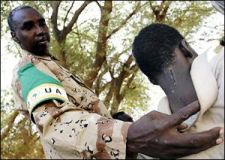African leaders wrap up summit on Sudan’s Darfur crisis in Chad
NDJAMENA, Feb 16 (AFP) — Several African leaders wrapped up summit talks, agreeing on steps to ensure respect of a ceasefire in the western Darfur region of Sudan, which has been wracked by strife and a humanitarian crisis.

|
|
An African Union (AU) peace keeper shows injuries on a former detainee, allegedly inflicted by Sudanese forces, after a prisoners release at a AU compound in el-Fasher in the Darfur region.(AFP). |
They urged the executive of the joint ceasefire Commission on Darfur to send a fact-finding team to verify positions occupied by the opposing sides with a view to map out a separation plan, according to the final communique.
They also called on the parties “to scrupulously respect the Ndjamena ceasefire accord of April 8, 2004 and the Abuja protocol of November 2004 on improving the humanitarian situation and bolstering security in Darfur.”
They also took note of “the commitments made before them by (Sudanese) President (Omar) el-Beshir during this summit.”
The communique gave no details of El-Beshir’s commitments but after it was read out, the Sudanese leader told his peers that he had “withdrawn all his bombers from Darfur”.
“We pledge to respect and implement all the agreements signed in Nairobi within a federal framework to bring about peace in Darfur,” he added. “I call on the rebels and those who back them to come to the negotiating table to find a final solution to the crisis,” el-Beshir said.
The summit participants also called on mediators to “prepare the resumption of peace talks to find an agreement between the parties on the Darfur crisis,” the communique concluded.
The Ndjamena gathering brought together Presidents Omar Bongo Ondimba of Gabon, Denis Sassou Nguesso of the Congo Republic, Chad’s Idriss Deby, el-Beshir and Alpha Oumar Konare, a former president of Mali who is now chairman of the commission of the African Union.
Their aim was to get a ceasefire back in place among parties to the partly political and partly ethnic conflict in Darfur. This pits two rebel groups from the local population of black African origin against an Arab horseback militia, the Janjaweed, widely accused of major human rights violations.
Nigeria’s President Olusegun Obasanjo, whose country hosts peace talks among the Sudanese parties which were suspended in December after breaches of the truce signed in April last year, had been expected in Njdamena but had other engagements.
Instead, Nigeria sent African Integration Minister Lawan Gana Guba, Chadian officials said. Libya and Egypt were also represented.
A UN commission of enquiry last month found gross rights violations have taken place in Darfur, where the rebellion erupted in February 2003, and top UN human rights official Louise Arbour was to brief the UN Security Council on Wednesday.
In addition to violence, many have died of disease in Darfur, where squalid and dangerous camps have been packed with internally displaced fleeing the fighting.
The Darfur death toll was estimated at 70,000 months ago, although that number was based on spotty information and covered only several months in the two-year conflict.
Thousands are believed still to be dying each month and more than one and a half million are in camps, either internally displaced or across the Chadian side of the border.
